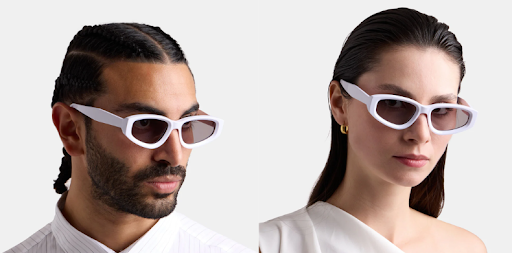
Polarized vs. Non-Polarized Sunglasses: Which is Best for You?
Can you realize the importance of choosing the right sunglasses after attending a fishing trip on a scenic lake with friends who could spot fish underwater? When someone asked, "Can you see the fish?" it seemed like a joke; how could anyone see through moving water? It all comes down to whether the sunglasses are polarized or not. This sparked a realization about eye protection that extends far beyond just style.

Furthermore, sunglasses don't just look good, they protect your eyes from harmful UV rays and enhance your vision. Choosing polarized or non-polarized lenses is one of the most important factors when choosing sunglasses.
Interested in knowing about polarized or non-polarized sunglasses, and which one is best for you? We've got what you're looking for. Let's talk details and find the right choice for you.
What Are Polarized Sunglasses?
Polarized sunglasses are designed with a special chemical coating that reduces glare from surfaces like water, snow, glass, and roads. This feature makes them ideal for outdoor activities where bright reflections can cause discomfort or impair vision.
How Do Polarized Sunglasses Work?
The glare from sunlight can cause eye strain and even damage when it reflects off horizontal surfaces like water, snow, or glass. Polarized lenses are equipped with a vertical filter that prevents the transmission of horizontally polarized light, which reduces glare and improving your vision.
Key Benefits of Polarized Sunglasses
- Reduced Glare: Polarized lenses significantly reduce glare from reflective surfaces, enhancing your vision and alleviating eye strain.
- Improved Contrast: By filtering out polarized light, polarized sunglasses can improve contrast and make it easier to see details in bright conditions.
- Enhanced Depth Perception: Polarized lenses can provide better depth perception, which is particularly beneficial for activities like driving or boating.
- Eye Protection: Polarized sunglasses offer the same UV protection as non-polarized sunglasses, shielding your eyes from harmful UV rays.
When to Choose Polarized Sunglasses
- Driving: Polarized lenses minimize glare from the road, car hoods, and reflective surfaces, enhancing driving safety.
- Water Sports: Whether you're fishing, boating, or simply enjoying a day at the beach, polarized sunglasses cut through the water's reflective glare, allowing you to see clearly.
- Outdoor Activities: Perfect for hiking, skiing, and other activities where bright light and glare are factors.
- Everyday Use: Ideal for people who spend a lot of time outdoors or have light-sensitive eyes.
What Are Non-Polarized Sunglasses?
Sunglasses without polarization reduce overall brightness without reducing glare. Providing basic UV protection, they're a good option for everyday use.
Despite the fact that non-polarized sunglasses can still reduce brightness and protect your eyes from harmful ultraviolet radiation, they may not offer the same level of visual clarity and comfort as polarized sunglasses, especially when driving on a sunny day or participating in water sports.
Also, non-polarized sunglasses are a more common and affordable option than polarized sunglasses. Their basic protection is against sunlight and UV rays, but they don't have a glare-reducing filter.
If you're on a budget or don't frequently encounter glare-inducing situations, non-polarized sunglasses can be a suitable choice. However, if you prioritize optimal visual clarity and glare reduction, polarized sunglasses are generally the preferred option.
Benefits of Non-Polarized Sunglasses
- UV Protection: Like polarized lenses, they block UVA and UVB rays, safeguarding your eyes from sun damage.
- Affordable: Typically, non-polarized sunglasses are more affordable than their polarized counterparts.
- Versatile: Suitable for both indoor and outdoor use, especially in situations where glare reduction is not a priority.
- Suitable for Digital Screens: Polarized lenses can distort images on digital screens, making non-polarized sunglasses better for activities involving screen use.
When to Choose Non-Polarized Sunglasses
- Suitable for use indoors or in shaded areas where glare is not a problem.
- Non-polarized sunglasses are a good option when you need moderate protection but don't require significant glare reduction.
- In some cases, non-polarized sunglasses are better for pilots or drivers, as polarized lenses can interfere with seeing digital displays or instrument panels.
Polarized vs. Non-Polarized Sunglasses: Key Differences
1. Glare Reduction
Polarized: Specifically designed to reduce glare from reflective surfaces, making them ideal for bright and sunny conditions.
Non-Polarized: Affects overall brightness without addressing glare specifically.
2. Visual Clarity and Comfort
Polarized: Provides greater clarity and reduces eye strain, making them comfortable for prolonged use.
Non-Polarized: Provides basic eye protection and comfort without improving visual clarity.
3. Color Perception
Polarized: Improves color perception by filtering out reflective light.
Non-Polarized: Offers a natural color view without significant enhancement.
4. Price Range
Polarized: Generally more expensive due to more sophisticated lens technology.
Non-Polarized: Often more budget-friendly and accessible.
5. Compatibility with Digital Screens
Polarized: May distort or make digital screens harder to read.
Non-Polarized: No issues with digital screen visibility, making them a better choice for tasks involving digital devices.
Advantages and Disadvantages: A Quick Comparison
| Feature | Polarized Sunglasses | Non-Polarized Sunglasses |
| Glare Reduction | Excellent | Minimal |
| Visual Comfort | High | Moderate |
| Color Perception | Enhanced | Natural |
| Price | Higher | Lower |
| Screen Compatibility | May distort Screens | No Distortion |
| Suitability for Sports | Best for water sports, skiing, and outdoor activities | Suitable for general use, especially in lower-light conditions |
How to Choose the Right Sunglasses for You
Consider your lifestyle and activities to determine whether polarized sunglasses are the best fit for you. If you frequently engage in outdoor activities where glare is a common issue, such as driving, fishing, or boating, polarized sunglasses can significantly enhance your vision and comfort. However, if your activities are more varied or involve indoor and outdoor transitions, non-polarized sunglasses may be sufficient.
Evaluate your budget when making a decision. Non-polarized sunglasses are generally more affordable, while polarized sunglasses may require a higher investment. With sensitive eyes or a history of eye strain, polarized sunglasses can provide extra comfort and clarity, possibly reducing discomfort. Ultimately, the best choice depends on your individual needs and preferences.
Explore La Bohème Official Sunglasses Collection
At La Bohème Official, we understand that choosing between polarized and non-polarized sunglasses is a personal decision influenced by your lifestyle, activities, and preferences. That’s why our collection offers both polarized and non-polarized options in a range of styles, colors, and designs. Whatever you're looking for, we've got the perfect pair of polarized sunglasses for water sports or non-polarized options for everyday wear.

Explore our collection today to find the ideal sunglasses to match your needs and style. With our commitment to quality and design, you'll find a pair that suits you perfectly.
Final Thoughts
Sunglasses with or without polarization depends on your needs and preferences. If you're constantly blinking due to bright reflections or engaging in outdoor activities, polarized sunglasses could be the best investment. On the other hand, if you are looking for an affordable pair for general use without worrying about glare, non-polarized sunglasses might be the ideal choice.
Also, determine which sunglasses are best for you based on your lifestyle, budget, and eye health. Always make sure your sunglasses offer adequate UV protection, whether they're polarized or non-polarized.





